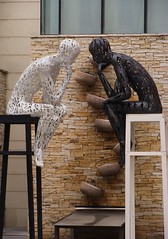 |
| Thinking |
Desktop computers entered the consumer world around the time I was heading to graduate school. My first professional position wasn't in a library, but was as a corporate technology trainer. Yes, my job was teaching others how to use this technology that was now on their desktops. Back then, using technology meant learning a variety of different commands in whatever software was on the computer. There was a sense of accomplishment in understand how to format a document in word processing software or programming a complex set of commands in the spreadsheet software. All of those commands were worth knowing and using because you could see how the end result was better.
With that as a prologue, let me encourage you to learn the in's and out's of the technology that is at your fingertips. Yes, you can open up your word processing software and just type, but there are a ton of commands in the menu - learn what they do! Ditto for the spreadsheet software you're using and any other software you are using on a regular basis.
If you are a student, I can tell you that getting to know the software you are using for your assignments will make those assignments look much better. Yes, better formatting (subheadings, margins, line spacing, pagination)! You'll also find that there are menu options (e.g., thesaurus) that can help you create a better sounding assignment. Then there is the magic of tables, merging, etc. that can streamline your work.
If you are an information professional, taking time to get a better handle on the software you're using can help you work smarter. We often don't have enough time in the day, so fighting with your software to get something done is not a good use of time.
By the way, often there is a more "command driven" way of using software. Don't be afraid of that. Yes, that includes understanding those codes that are actually in the typed documents you're creating. Just trust me that a little knowledge of those commands will be helpful.
If you don't think you can learn these tools on your own, training is available. Look for low-cost or free training options through your library, library consortium, Lynda.com, and other web-based training services. You might find free tutorials on the Internet or YouTube. If there is someone in your midst, who is really good with technology, you might ask that person to give you a lesson. No, you do not need to spend hundreds of dollars on training!
Besides the software on your computer, get to know the software you are using to search a library's databases or the Internet. If you're working with special software to help you with digitization, metadata creation, or something else, learn the in's and out's of that software, too. Consider how awesome it would be to know become more proficient at that software than the people around you! You would become one of the go-to people for help, and that would make you stand out in a positive way.
If you don't feel that you can learn this software on your own, check to see what training is available from your database providers and the other suppliers of the software in your library. It is likely that there is free training available. You might also seek out someone who is more proficient and ask if that person can given you an one-on-one lesson in those commands the person finds most useful.
I haven't talked about your mobile device. Yes, those are indeed powerful devices and likely you don't know enough about them. Take time to learn what they can really do. Waiting for a meeting or standing at the bus stop? Explore the apps that you have or search to find better apps for what you want to do. (I always look for free apps and I can tell you that there are lots of awesome free apps available.)
Finally, I've made this post about you, but let me say that if you learn the technology that is around you, you'll be able to answer technology questions your community members have. In addition, you'll be able to do one-on-one or group technology training, which many librarians do as part of their positions.
Previous posts in this series:
- Upping Your Library Intelligence: An Area You Need To Focus On
- Upping Your Library Intelligence: Words Matter
- Upping Your Library Intelligence: Reading, Listening, and Watching
- Upping Your Library Intelligence: Expanding and Tapping into the LIS Network
Interested in having Digitization 101 delivered to your inbox? Use the sign-up box on the right side of the blog or use the box in this post.
